
Delaware Center for Civics Education at IPA

Subscribe to Our Mailing List
By joining our mailing list, you’ll be the first to know about new resources, upcoming training opportunities, and our latest work. You’ll also receive a monthly newsletter.
FOSTERING HIGH-QUALITY CIVICS AND SOCIAL STUDIES K–12 EDUCATION
The Institute for Public Administration's Delaware Center for Civics Education provides resources and support for teaching and learning aligned to Delaware's civics standards so that preservice and professional educators are well-equipped to prepare their students for college, career, and civic life.
The Delaware Center for Civics Education staff also teach an undergraduate course titled Civics and Economics for the Elementary Teacher. This course is required for all elementary education majors at the University of Delaware.
Featured projects

The Democracy Project Institute for Teachers brings together teachers (K-12) and leaders in government and education to discuss the importance of civic participation for the future of our democratic society and collaborate on ways to inspire active youth citizenship.
Democracy Project Summer 2026
Theme: Local Civics – Developing Students as Community Problem Solvers
Dates: June 22-24, 2026, at the Virden Center in Lewes, DE
Interest Form: www.surveymonkey.com/r/QJ77VS6
Information for the 2026 application is coming soon...

Governor's Award for Excellence in Civics Education–Teacher Award
The Delaware Civics Education Coalition seeks nominations for K-12 classroom teachers to be recognized for excellence in teaching civics. Awardees will be recognized at an awards ceremony where they will be presented with a plaque and a $100 prize.
To be eligible for this award, nominees must:
Have at least three years of classroom teaching experience and be teaching civics during the current academic year.
Plan to teach for at least one year following the award year.

Governor's Award for Excellence in Civics Education–School Award
- The Delaware Civics Education Coalition seeks nominations for K-12 Delaware schools that excel at advancing the mission of civics education. Awardees will be recognized with a banner that can be hung at the school.
To be eligible for this award, nominees must:
- Be a K-12 public, charter, parochial, private, or independent school in Delaware.
- Provide evidence showing that they have met or exceeded the criteria established for the award.

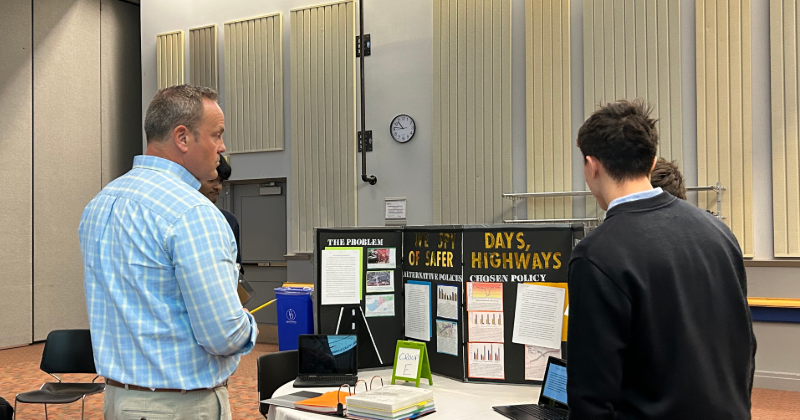
Each year, state coordinators of the Project Citizen program send one outstanding student portfolio to the Project Citizen National Showcase, where evaluators officially judge each portfolio's achievement level.
Upcoming Showcase
Date: March 27, 2026
Location: University of Delaware, Newark Campus
Summer Institute: June 22-26, 2026, at the Virden Center in Lewes, DE
Apply to Become Part of a Project Citizen Research Cohort by contacting Fran O'Malley.

We the People: The Citizen and the Constitution is a flagship civic education program created by the National Center for Civic Education to promote a greater understanding of our constitutional democracy, its institutions, and its fundamental principles and values. We the People culminates with simulated congressional hearings where students testify before a panel of judges acting as members of Congress.
The Delaware Center for Civic Education (DCCE) helps to integrate We the People resources in alignment with Delaware standards and model lessons by serving as Delaware state coordinators for the program and supporting the implementation of grant programs to expand its use. For example, DCCE implemented the Civics that Empowers All Students grant program to expand We the People to Delaware's elementary and middle school students.
Read about the CEAS Program here:
For more information about how to leverage We the People resources, please email DECenter4Civics@udel.edu.
Calling all middle school students! Share your ideas and flex your civics knowledge in the National Civics Bee®.

About the Bee
The Delaware Center for Civics Education is partnering with the U.S. Chamber of Commerce Foundation to host a nonpartisan civics competition that encourages young Americans to engage in civics and contribute to their communities. Participating 6th, 7th and 8th graders will flex their civics knowledge for a chance to win recognition and cash prizes. Finalists will be invited to Washington, DC to compete in the National Civics Bee National Championship in Fall 2026.
Why Civics?
We are hosting the National Civics Bee Delaware State Finals because we believe that informed and active citizens make for a strong country, a strong economy, and a strong workforce, and that our continued prosperity depends on the strength of all three. Through the Bee, we are promoting greater civic knowledge throughout Delaware and celebrating our civic pride.
How to Enter
Any 6th-, 7th-, or 8th-grade student residing in Delaware with an idea about using civics to improve their community may submit an application to participate in the competition. All applications must be submitted by Tuesday, February 3, 2026, at 11:59 p.m. Hawaii Time.
Visit the National Civics Bee website for the latest news on the application portal, entry deadlines, and resources.
Students should review the Contest Rules below and then apply here using the official 2026 National Civics Bee Application Link
Resources/Additional Information
- Educator Toolkit
- Essay Application Guide
- National Civics Bee Highlights Video
- National Civics Bee Website
- Student Flyer
- 2026 National Civics Bee Contest Rules – Phase 1
State Finals
- Date: Friday, June 12th
- 1:00 pm Eastern
- Venue: to be determined.
- Prizes: 1st Place ($1,000 for student, $5,000 for winner’s school); 2nd Place ($500); 3rd Place ($250).
Contact Us/Sponsorship Opportunities
Are you interested in showcasing your company's commitment to developing active and engaged citizens? For details regarding available corporate sponsorships, general questions, or to request additional information, please contact the Delaware Center for Civics Education via email.
About these Lesson Plans
Lessons developed for the Teaching and Commemorating the U.S. Declaration of Independence are sponsored in part by the Library of Congress Teaching with Primary Sources Mid-Atlantic and US Territories Region Program, located at the American Historical Association. Content created and featured in partnership with the TPS Mid-Atlantic and US Territories Region does not indicate an endorsement by the Library of Congress.
Upper Elementary School Lessons
MISSing from HIStory: Mary Katharine Goddard
In this lesson, students will engage in a range of activities that incrementally reveal the story of the only woman whose name appears on a copy of the Declaration of Independence that was printed and circulated within months (January 18, 1777) of its approval by the Second Continental Congress. Featured children’s book Her Name Was Mary Katharine [Goddard] by Ella Schwartz.
Remove the Records
In this lesson, students will be presented with “pieces of a puzzle” (primary and secondary sources) that can be used to construct a tentative account of the story of Stephen Pleasonton who, during the War of 1812, had the wits to secure original copies of the Declaration, Constitution, and other state papers and save them from burning along with our U.S. Capitol building and the White House. Featured children's book - Rescuing the Declaration of Independence: How We Almost Lost the Words that Built America by Anna Crowley Reddin.
Melted Majesty
In this lesson, students will review the events surrounding the statue of King George III that was erected in Bowling Green, NY. Students will create a chronology of events and use the chronology to determine the effect of the signing of the Declaration of Independence on the future of the statue.
Middle School Lessons
Our Declaration’s Principles: Ideal v Reality
In this lesson, students will read brief excerpts from the Declaration of Independence to determine principles of the American political system. They will then consider key events or developments in American history and draw conclusions about the extent to which they suggest that the American people have or have not lived up to these principles to which our nation claims to be committed.
Why Declare? Examining the “Facts” of the Declaration of Independence
This lesson asks students to consider a collection of the “Facts” listed in the Declaration of Independence, and connect them with other primary sources to provide context as to its purpose. In doing so, they will assess the validity and credibility of the claims to better understand how perceptions of different grievances shaped the decision to declare their independence.
Middle-High School Lessons
Preserving American Memory Through Art (but of what?)
John Trumbull’s 1818 painting entitled The Declaration of Independence, July 4, 1776 is a truly iconic piece of art - regarded as representative of the founding of our nation. It hangs in the U.S. Capitol Rotunda. Despite its renown, historians and scholars have debated exactly what event it depicts. In this lesson, students will analyze Trumbull’s work as well as the interpretations of what it is intended to depict.
Monumental Decisions: The Caesar Rodney Statue Tug of War
In this lesson students will debate Delaware Senate Concurrent Resolution 65 (introduced into the Delaware General Assembly on 5/6/25 and laid on the table in the Senate), communicate their positions to their representatives, and follow the actions of elected officials as they debate the Resolution.
High School Lessons
Commemorating the Declaration
In this lesson students will compare the Centennial and Sesquicentennial celebrations to explore how Americans saw themselves at two important moments in history, identifying and explaining patterns of continuity and change. Further, how will these past commemorations compare to what we observe during the Semiquincentennial? What will stay the same and what will change?
Equality and the Global Influence of the Declaration of Independence
In this lesson, students will explore how the Declaration of Independence shaped evolving ideas about equality in the United States. By analyzing excerpts from the Declaration and primary sources written by and to Thomas Jefferson, students will investigate how Jefferson’s own views on equality were expressed, challenged, and interpreted over time. Using strategies like IREAD, document sourcing, and comparative analysis, students will unpack the complexity of what Jefferson meant when he wrote that “all men are created equal.”
Mission Statement
The Delaware Civics Education Coalition is a nonpartisan coalition of groups in Delaware engaged in civic education activities that are working to elevate civic education and engagement as a state priority in order to protect and strengthen America's constitutional democracy. This includes building a shared commitment to ensure that all young people are prepared to assume their rights and responsibilities to participate in civic life and address the issues facing students, their families, and communities in our increasingly dynamic and digital society.
To achieve this mission, the Delaware Civics Education Coalition promotes nonpartisan policies that support engaging K–12 civic learning, both in- and out-of-school.
Program Goals
- Establish and institutionalize the Delaware Civics Education Coalition
- Conduct an environmental scan of civics education policies, achievement, and opportunities in Delaware
- Raise awareness of (or create) civics-related opportunities that deepen students' understanding of content and duties
- Provide professional learning that supports Delaware's civics standards, especially for grades 4, 7, and 11
- Lay the groundwork for the establishment of school and teacher recognition programs (e.g., Centers for Excellence in Civics Education, and Teachers of Excellence as Civics Educators)
Member Organizations
American Constitution Society of Delaware
Norm Monhait:
nmljd5@aol.com
American Legion Auxiliary's Girl's State Program
Lisamarie McCarley:
DEGS1919@gmail.com
Delaware American Legion Boy's State Program
Charles Michel:
delawareboysstate@gmail.com
Delaware Center for Civics Education
Ed Freel: efreel@udel.edu
Fran O'Malley: fomalley@udel.edu
Scott Abbott: sabbott@udel.edu
Delaware Department of Education
Michael Feldman:
Michael.Feldman@doe.k12.de.us
Delaware Department of Elections
Rebecca Argo: rebecca.l.argo@delaware.gov
Rebecca Fay:
rfay@dehistory.org
Michele Anstine:
manstine@dehumanities.org
Delaware Law Related Education Center
Pat Quann:
delrecntr@aol.com
League of Women Voters of Delaware
University of Delaware Department of Political Science & International Relations
David Redlawsk:
redlawsk@udel.edu
YMCA Delaware Youth in Government
Anesha Truesdale:
atruesdale@ymcade.org
Partnerships
The Delaware Center for Civics Education also provides a range of activities through partnerships with:
award for Excellence in Civics Education–Teacher Awardees
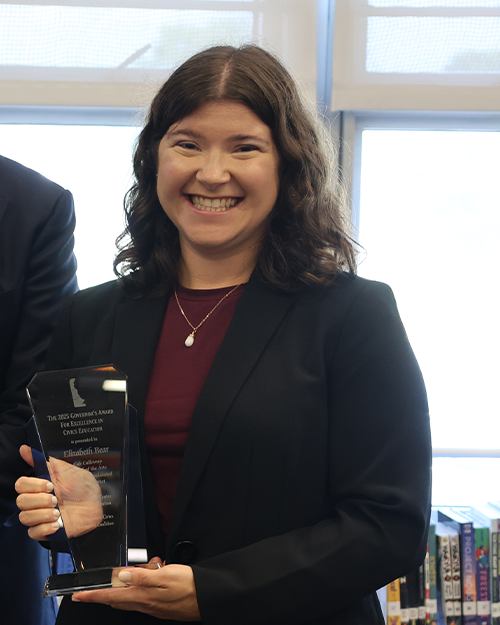
Lizi Bear
Cab Calloway School for the Arts
Red Clay Consolidated School District
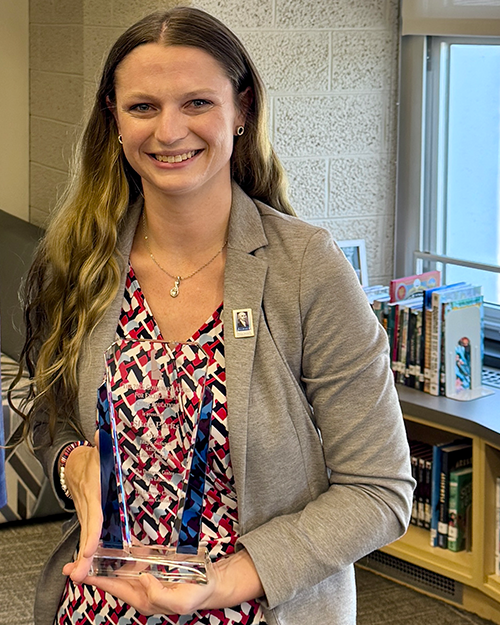
Shae Parks
Milford High School
Milford School District
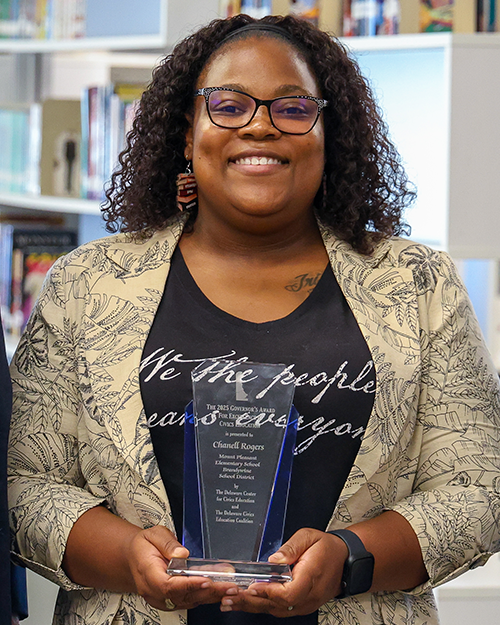
Chanell Rogers
Mount Pleasant Elementary School
Brandywine School District
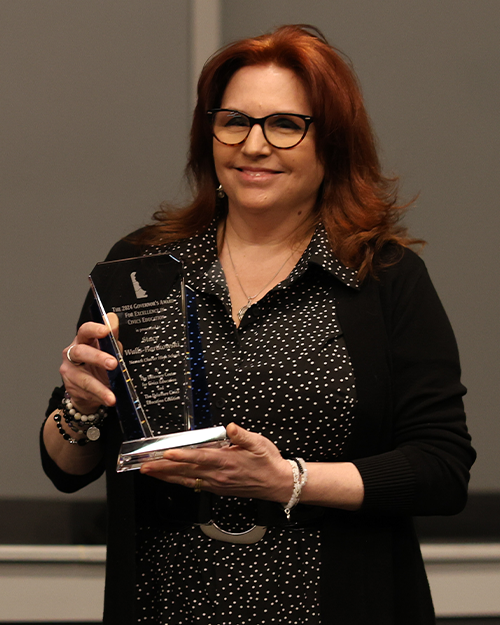
Stacey Bartkowski
Newark Charter School
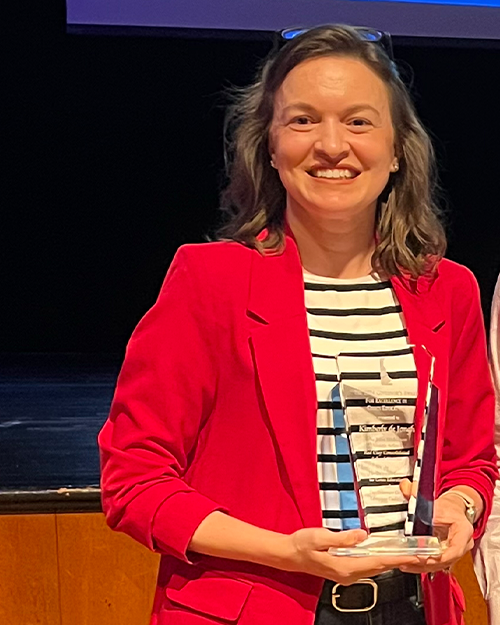
Kim de Jongh
The John Dickinson School
Red Clay Consolidated School District

Nathan Moser
Freire Charter School

Christina Horstmann
William Penn High School
Colonial School District

Erica Varites
Cooke Elementary School
Red Clay Consolidated School District
Award for Excellence in Civics Education–School Awardees

william penn high school
Colonial School District

cab calloway school of the arts
Red Clay Consolidated School District
Meet our Team

Fran O’Malley is a Policy Scientist at IPA serving as Director of the Delaware Center for Civics Education. Fran’s current projects include developing civics curricula and assessments for Delaware schools, facilitating professional learning, and serving as a state coordinator for the National Center for Civics Education and in advisory roles for the Council of Chief State School Officers (CCSSO) and the National Assessment Governing Board (NAGB). He also helps prepare future teachers by teaching a Civics and Economics for Teachers course and serves on the Boards of the Hockessin 107c Colored School and the Delaware Law Related Education Center. Fran earned his bachelor’s degree from St. Joseph’s University (Philadelphia) and his Master’s and ED.D. from the University of Delaware.

Ed Freel is a Senior Fellow at the Institute for Public Administration, where he provides expertise in civic education, political management, and early childhood education. Prior to retiring as a University of Delaware professor and IPA Policy Scientist in 2017, Ed co-founded The Democracy Project with Fran O'Malley. He also started the Semester in Washington, D.C. Program, connecting UD students with internships on Capitol Hill. Prior to joining Congressman Thomas R. Carper as Chief of Staff in 1982, Ed was the first Director of the National Low Income Home Energy Assistance Program under President Carter. From 2001 to 2021, Ed worked as Senior Adviser to U.S. Senator Tom Carper (D-Del). Ed was appointed Delaware Secretary of State from 1994 to 2001, during which time he oversaw the development of the new Delaware Public Archives building in Dover.

Scott Abbott is Assistant Director of the Delaware Center for Civics Education (DCCE) at IPA and he supports civics education by teaching current and future teachers, writing curriculum and assessments, developing policy, and coordinating authentic civic learning experiences for students. Scott earned a BA in History and MAEd in Secondary Social Studies Education from Wake Forest University, and an Executive Masters in Leadership from Georgetown University.
Engaging Students in APPLIED Research
Alexis Oppong earned her Bachelor of Arts in Public Policy at the University of Delaware's Biden School of Public Policy and Administration. In 2023 and 2024, Alexis worked with the Institute for Public Administration through the Undergraduate Biden School Summer Fellows Program and the Public Administration Fellow Program. During her placement at IPA's Delaware Center for Civics Education (DCCE), Alexis developed skills in research, project management, and public speaking. She presented her research at UD's Undergraduate Research & Service Scholar Celebratory Symposium, compiled an extensive database of K–12 teachers within Delaware, edited and organized elementary and middle school lesson plans, and attended/organized professional development seminars and conferences for educators.
Alexis will continue her education at Duke University pursuing an Accelerated Bachelor of Science in Nursing Program. She hopes to connect her experience within public policy to help innovate and elevate the healthcare system.

Search IPA's Recent Civics Education Work
All Results
-
Teaching Controversial Issues Infographic
Abbott, Scott; O'Malley, Francis, 2025
-
Effective Elementary Social Studies Integration Infographic
Abbott, Scott; O'Malley, Francis, 2023
-
Delaware Summit on Civics Education 2019 Summary Report
O'Malley, Francis J., 2019
-
Marginalization of Social Studies Infographic
Abbott, Scott; O'Malley, Francis, 2018
-
Library of Congress Teaching Civics with Primary Sources Lessons Plans
O'Malley, Francis J., 2015

